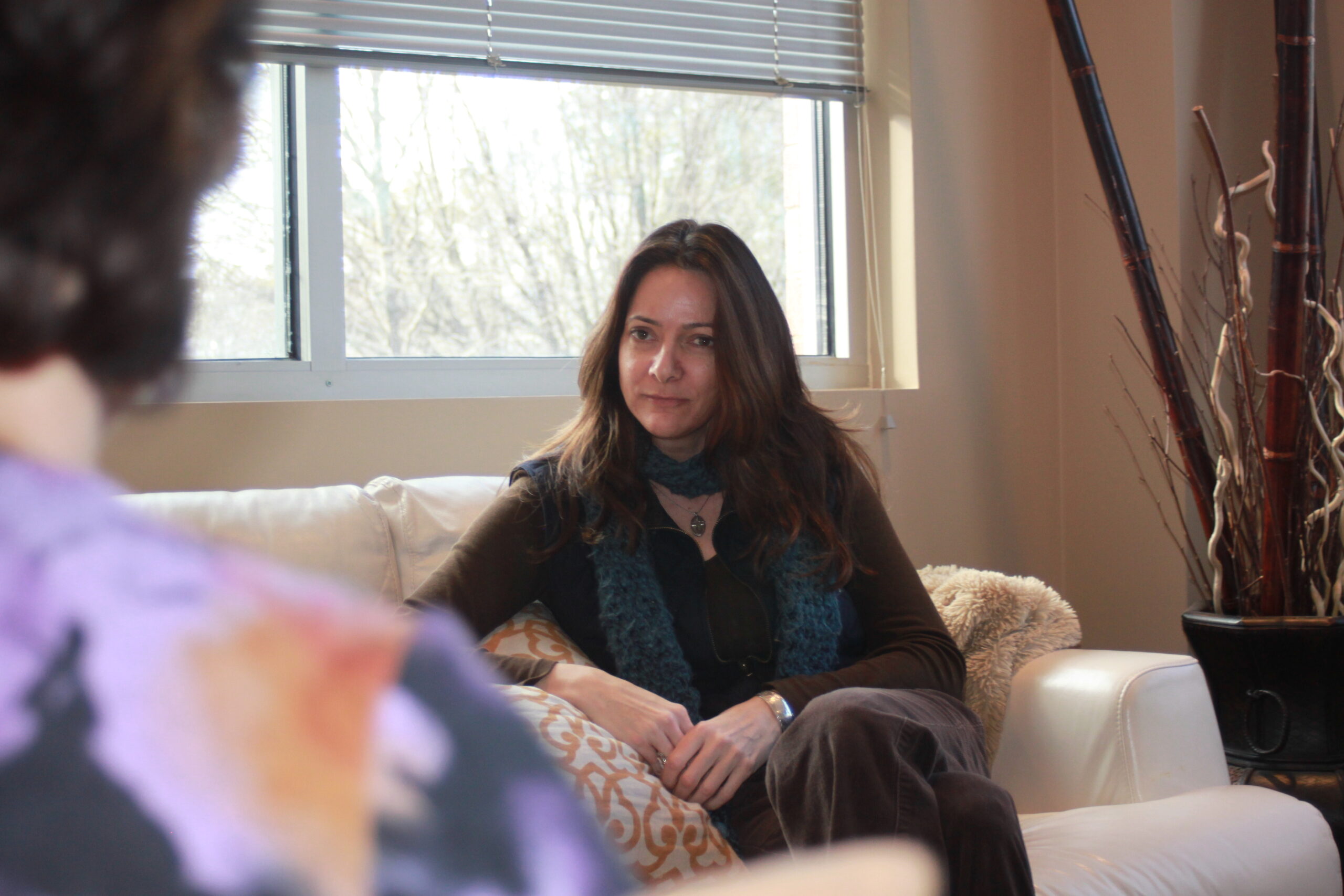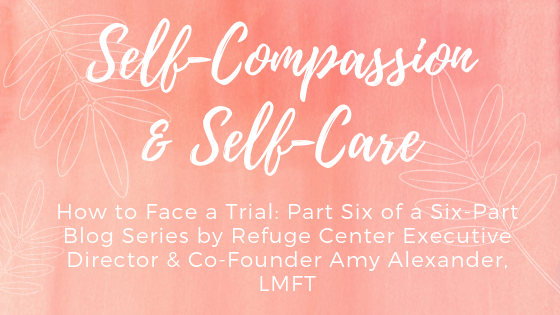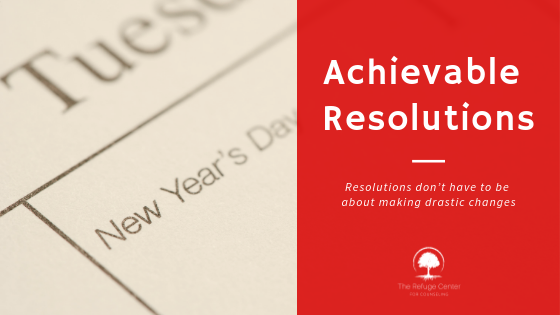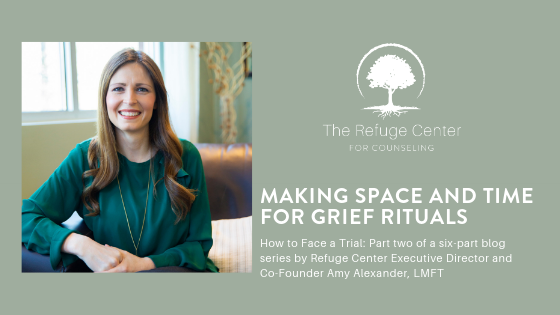Part six in a six-part blog series by Refuge Center Executive Director and Co-Founder Amy Alexander, LMFT
In this blog series we have explored the concept of “how to face a trial.” Suffering and hardship can be a breeding ground for negative beliefs about ourselves and our world to develop.
We can easily find ourselves in destructive cycles that leave us feeling resentful and helpless. One of the most important things we can do for ourselves in this time is to develop skills and practices that move us towards self-care and self-compassion.
Dr. Kristen Neff, expert on the topic of self-compassion, says, “Instead of just ignoring your pain with a “stiff upper lip” mentality, you stop to tell yourself “this is really difficult right now,” or “how can I comfort and care for myself in this moment?” Instead of mercilessly judging and criticizing yourself for various inadequacies or shortcomings, self-compassion means you are kind and understanding when confronted with personal failings – after all, who ever said you were supposed to be perfect?” (2019).
Giving yourself extra measures of grace, encouragement and comfort during a difficult season is vital to the healing process.
Linda Bennett was one of our staff therapists at The Refuge Center for Counseling and also the Director of our Compassionate Care program.
She was incredibly gifted at serving and nurturing others but in the summer of 2015, she was faced with the challenge of moving into a space where she needed to prioritize her own self-care. In 2016 she took the time to write down and share a bit about that experience in her words here:
Summer of 2015 brought with it a new trial for me to face. A few months of coughing, chest pain, and growing fatigue resulted in the eventual diagnosis of cancer—Stage IV Adenocarcinoma—which had begun in my lungs and spread to my brain before being detected in late August. It was a surprising diagnosis, given that I was active, healthy, and had never been a smoker. In fact, intent upon seeing my children grow up, I’d always been quite vigilant about screening for breast cancer, which took my mom’s life when I was 15. But now, at the age of 46, with a new husband and four kids between us, I faced my own terminal diagnosis. That’s the trial I face today–living with cancer, as well as I am able for as long as God allows.
I’m learning that living well with cancer requires me to have a deeper level of compassion and grace for myself. I make peace with my humanity almost daily as I’m made aware of limits to my energy level and physical strength and as odd, new symptoms of this disease or its treatment crop up. Sometimes those changes frustrate me, but, more and more, I find myself laughing–not in a mocking sort of way, but with lighthearted surrender and self-acceptance. Learning to love myself well—apart from any performance-based standards—is one of the very best gifts this trial has offered.
In the season following my diagnosis, self-love, the love of my family, and the desire to be as well as possible for as long as possible led to a fresh commitment to extreme self-care. That required slowing down, often, and asking myself what I needed most. My list included: a ton of rest, good medical care, super healthy foods, time with God, and the support of people I love who loved me well. Being honest with myself about my needs and vulnerable with friends and family in sharing them was an important part of caring for myself and afforded countless opportunities to see those needs met in healthy, appropriate ways by God, myself, and trusted others. I continue to grow in my practice of self-care and am overwhelmed and humbled, still, by the love and care of friends and family and some very kind strangers–yet another very good gift of this trial.
Having compassion for myself and engaging in this level of self-care required me to step back from my work for a season and from commitments at my church–even though both were very fulfilling endeavors in my life. I’d heard it said years earlier that “the good is the enemy of the best.” That truth resonated deeply within me and helped guide my choices during that season and today. I’ve become keenly aware of the reality that our time and energy and life and breath are limited resources, and that we must say “no” to some very good things in order to say “yes” to God’s best for us every day. Guided by God’s wisdom, self-compassion, and loving care for myself and others, my hope is that I will continue to grow in discernment of each day’s good and its best and that I will learn to choose between them with purposeful intentionality. In doing so, may I steward wisely the life-breath I’m given each day—as well as I am able for as long as God allows–and may that be the most precious gift that comes from facing this trial.

Linda ended up passing away on October 23rd 2016.
Everyone that loved and knew her had an opportunity to witness her beauty as she took gentle, intentional steps to give herself compassion in a season where she could do the least but ended up being the most present and spiritually alive.
Just like Linda, we can give ourselves compassion and care in hardship.
The following poem by Melodie Beattie does a beautiful job of teaching us how to walk forward in a pace that reflects this.
Spirit Pace
Go easy. You may have to push forward, but you don’t have to push so hard. Go in gentleness, go in peace.
Do not be in so much of a hurry. At no day, no hour, no time are you required to do more than you can do in peace. Frantic behaviors and urgency are not the foundation for our new way of life.
Do not be in too much of a hurry to begin. Begin, but do not force the beginning if it is not time. Beginnings will arrive soon enough.
Enjoy and relish middles, the heart of the matter.
Do not be in too much of a hurry to finish. You may be almost done, but enjoy the final moments. Give yourself fully to those moments so that you may give and get all there is.
Let the pace flow naturally. Move forward. Start. Keep moving forward. Do it gently, though. Do it in peace. Cherish each moment.
Today, God, help me focus on a peaceful path rather than a harried one. I will keep moving forward gently, not frantically. Help me let go of my need to be anxious, upset and harried. Help me replace it with a need to be at peace and in harmony.
Read past blog posts in Amy Alexander’s “How to Face a Trial” series:
Part Two: Making Space for Grief




